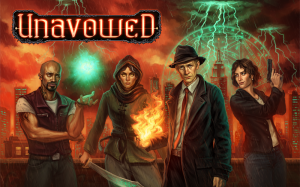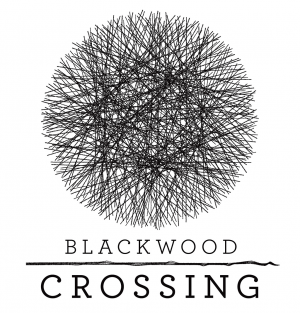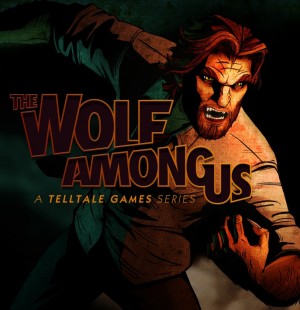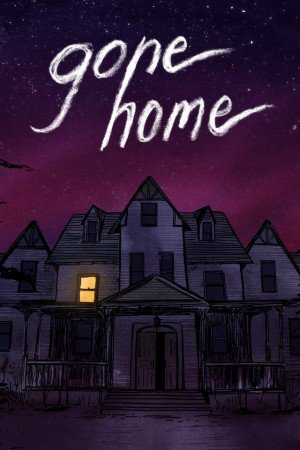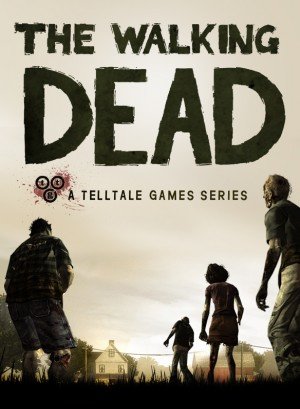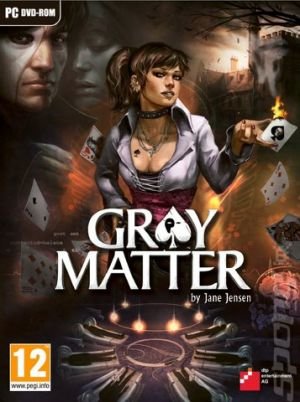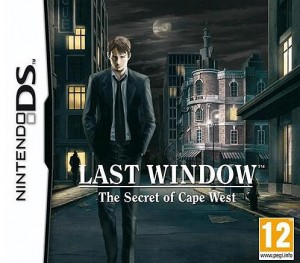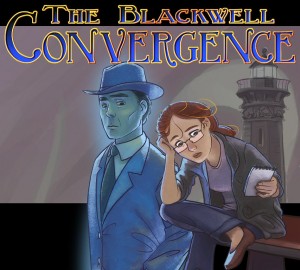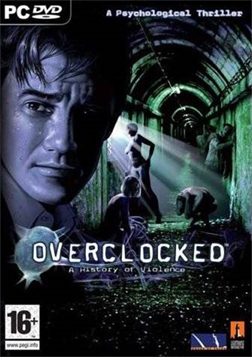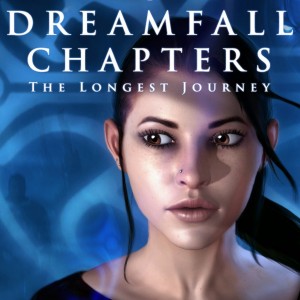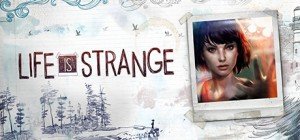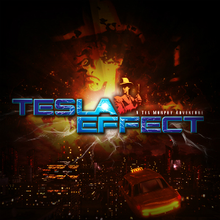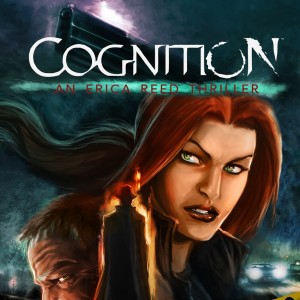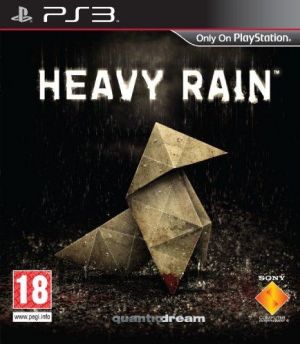Best Writing – DramaAggie Award Winners

If comedy lifts the soul, then drama explores and challenges it. Though sometimes misrepresented as dry and boring or overly theatrical, a gripping drama simply engages players on a deeper emotional level. Quality writing is essential in maintaining the player’s connection to the characters, game world, and the story unfolding.
» Aggie Awards - category overview
The Aggie award winners:
Life Is Strange 2 (2019 winner)
The tale of two brothers on the run in an America that pigeonholes them as outsiders, Life Is Strange 2 has a heavy weight to carry. It’s all too easy for drama to cross the line into melodrama, especially when dealing with charged topics like racism and immigration. While DONTNOD’S five-part episodic sequel does occasionally fall into this trap, overall its script is a standout example of dramatic writing in a video game – one that succeeds not because of the so-called “important issues” it explores but because of its critical mass of quiet moments, when characters get a chance to connect with each other and express their humanity. Fighting to stay alive and stick together, Sean and Daniel Diaz are ordinary (for the most part) kids up against impossible odds, and their journey is riveting in large part due to the relatable, colloquial, and believable dialogue they share with each other and a diverse supporting cast, so there’s nothing strange about it taking home our best dramatic writing Aggie.
2019 winner of:
2019 Readers Choice' winner of:
- No awards won
Unavowed (2018 winner)
Clever plotting and skillful writing don’t always go hand in hand, but in the case of Wadjet Eye’s Unavowed, they most certainly do. The game is able to tackle weighty themes and troubling circumstances (morally and otherwise) by peppering its story with interesting, thought-provoking conversation that always keep the dialogue flowing naturally. Every character is portrayed in a way that is entirely believable, with distinct personal issues and endearing (or not-so-endearing) qualities. This is no small feat with such diversity in the cast – not merely different genders and cultures, but entirely different species.
You can choose to question your fellow Unavowed as much or as little as you wish, but even on their own your teammates speak frequently to each other without any prompting, affording you additional insight via their private conversations. Their personalities are so defined, however, and their backstories so rich that we couldn’t help but explore every relationship, even replaying with different partners to uncover new details. Logan’s understanding nature, along with Vicki’s down-to-earth, matter-of-fact attitude, perfectly offsets Mandana’s cold, semi-human objectivity. For its realistic conversation and elegant script throughout each branching narrative path of this ambitious dark urban fantasy tale, Unavowed pairs its Best Story award with the Aggie for best dramatic writing in 2018.
2018 winner of:
Blackwood Crossing (2017 winner)
PaperSeven’s Blackwood Crossing starts out as a deceptively simple tale that becomes more and more surreal as it careens toward an eye-opening finish. Scarlett, the freckled, red-headed protagonist, wakes up on a train where she is both charmed and harried by her fidgety brother Finn. The siblings soon meet other passengers wearing cardboard masks that they begin to identify as family, friends and enemies. Why Finn and Scarlett are on this journey and what their ultimate destination will be are deeply-held mysteries. Just as you begin to get a handle on the character relationships, the train suddenly becomes carpeted with grass and flowers, a ladder leading up to even more dream-like locales. These new scenes provide glimpses into the past as Scarlett desperately seeks to resolve a tragedy that shadows them all – especially the engaging, impulsive Finn.
Rather than relying on lengthy exposition, dialogues here are succinct but relatable, concisely yet impressively touching on past conflicts and escalated events. As more is revealed, plot tidbits are fused into a narrative that continually teases, grips, and then confounds throughout the game’s tightly-focused four-hour play time. The bizarre situations and fanciful scenarios encountered begin to evoke emotions that become achingly real. Players must gradually come to terms with what the main characters can accomplish and are forced to accept – including when to hold on and when to let go. For keeping us guessing and then tugging at our heartstrings as the light of realization dawns, Blackwood Crossing poignantly snags our best dramatic writing Aggie for 2017.
2017 winner of:
2017 Readers Choice' winner of:
- No awards won
Kathy Rain (2016 winner)
In most respects, Kathy Rain emulates the titans of graphic adventures that stood as the best of their kind during the nineties. The game’s look, concept, sound design, puzzles, and even particular story beats all have strong ties to iconic titles, most notably Sierra’s Gabriel Knight. Stylistic influences from seminal television programs are also apparent: The X-Files and Twin Peaks come to mind almost instantly. But the development team at Clifftop Games, rather than attempting to disguise its inspirations, has managed to skillfully embellish the concepts put forth by the these classics, penning a gripping story all their own, and injecting it with an abundance of believable character, clever charm, and thrilling drama.
Kathy Rain doesn’t feature a protagonist out to save the world or commit other altruistic noble acts. Instead, Kathy is an independent, resourceful, headstrong loner who reluctantly undertakes the task of looking into the strange events surrounding her late grandfather’s final years. At first, Kathy is an embittered outcast who can barely be bothered to show up to the man’s funeral; by the end, she’s been forced to confront painful truths about her missing father and estranged mother, as well as deal with some life-altering decisions from her own past. As incredible as the story gets toward the end, the drama is as realistic as it is impactful, making Kathy Rain one of the most relatable dramatic games in recent memory, and a worthy winner of our Best Dramatic Writing Aggie.
2016 winner of:
2016 Readers Choice' winner of:
Her Story (2015 winner)
Everyone loves a mystery, but very few seem quite so mysterious as Sam Barlow’s Her Story. The narrative is presented through video clips from multiple police interviews of a sole character, the titular "Her." The thing is, the many video fragments are out of order, leaving you to piece them together like a puzzle and discover what really happened. The nature of the story automatically makes it feel foreboding: You're on a computer in the basement of a police station, digging through old case file interviews using only keywords, the first of which is "murder," the only clue provided to get you started. The unique gameplay mechanics play a significant part in keeping the narrative interesting, but Her Story wouldn't have been successful without an intriguing story to support it. Fortunately, writer-director Sam Barlow delivers a thoroughly compelling yarn filled with intrigue.
Some of the video clips are small, a few conveying only a single word. Others contain humorous anecdotes, emotional confessions, and even songs. Certain details offer important glimpses into the lives of other people connected to the case, and as with all mysteries, shocking reveals are exposed along the way. The narrative twists far beyond what you first expect starting out, delving deeply into the psyche of its focal character. To say more would deprive players of the joy of personal discovery, but suffice it to say, this is a rich character study of a complex woman, its larger story opening up to become the proverbial riddle wrapped in a mystery inside an enigma. Even the ending is left somewhat ambiguous, encouraging you draw your own conclusions. Thanks to its strategic plotting and deft script, it all feels very organic, true to life in both its mundane details and most intimate moments. A good indication that any piece of writing has been worthwhile is when it stays with you for a long time, and Her Story is still foremost on our minds in awarding it our best dramatic writing Aggie for 2015.
2015 winner of:
2015 Readers Choice' winner of:
The Wolf Among Us (2014 winner)
While it might seem surprising to give the Aggie award for Best Dramatic Writing to a game whose major characters include a foul-mouthed, four-foot toad, an escaped pig with a taste for whiskey, and a hot-tempered lycanthropic sheriff, the ability to handle its fantastical cast of characters with such a masterful touch is exactly why The Wolf Among Us is so deserving. These are fairy tale characters in human disguise living in modern-day New York, and there is such reverence shown to each character’s individual pathos that it’s almost impossible not to get caught up in their motivations, conflicts, and tragic flaws. The writing compels us to viscerally experience each Fable’s miserable plight while building towards an unforgettable conclusion.
[The Aggie Awards - The Best Adventure Games of 2014 - Image #2] Even more impressively, as Sheriff Bigby Wolf struggles to control the beast inside, the script feels entirely authentic throughout every player choice, allowing you to craft the Bigby you want to play, not one the writers have railroaded you into inhabiting. The Wolf Among Us may be based on Bill Willingham’s innovative comic series, but Telltale’s adaption is every bit as fascinating and strange, due in no small part to the studio’s continued excellence (and experimentation) in interactive storytelling.
2014 winner of:
2014 Readers Choice' winner of:
Gone Home (2013 winner)
In fiction writing, an author’s job is to fool the reader into thinking that a world made out of words is real. Games have it easier (pictures being worth a thousand words and all that), but even a beautifully rendered scene is empty until good writing brings it alive. Well, if you think the setting of this year’s Best Dramatic Writing winner is an empty house, you’ve got it all wrong. The house you explore in Gone Home is brimming with words – practically every item you look at, uncover, turn over, or flip through has a story to tell – and the quality of the script is what makes the game so captivating.
The masterful writing is most obvious in Sam Greenbriar’s audio diaries, narrated to her older sister Katie throughout the year Sam started a new high school, rebelled against her parents, and fell in love. Nuanced, intimate, and painfully relatable, Sam’s diaries remind us what it’s like to be a confused teen wrestling with emotions we all had to learn how to deal with even if our personal situations differed. But Gone Home’s writing goes far beyond these tape-recorded monologues. Every magazine, sheet of notebook paper, postcard, and even boxes of cereal strewn throughout the family house in some way contribute to the meticulous construction of a world three-dimensional not only in its graphics, but also in its narrative. And let’s not forget that writing isn’t only about words. Structure, pacing, foreshadowing, irony, climax and epiphany – good fiction nails these, and The Fullbright Company did exactly that.
2013 winner of:
2013 Readers Choice' winner of:
- No awards won
The Walking Dead (2012 winner)
he Walking Dead is not a game about zombies. It’s about a small group of strangers desperate to survive in a world that became unimaginably dangerous and terrifying overnight. Robert Kirkman, creator of the original comics, gets the credit for establishing the zombie apocalypse premise and for setting the survivalist tone. But Telltale takes home our award for Best Dramatic Writing for their gripping portrayal of an ever-shrinking group of survivors on a daunting pilgrimage with droves of "walkers" nipping at their heels. Controlling Lee Everett, a convicted murderer with a heavy conscience, the player grapples with impossible choices that run the gamut from who gets to eat to who gets to live, and these weighty decisions account for much of the game’s dramatic tension. Even more wrenching are the inevitable tragedies that befall a group divided from within and far outnumbered by the hungry undead that crave their flesh. But almost as often as it makes you cry or cringe, The Walking Dead makes you smile at the tender relationship between Lee and Clementine, the orphaned child he befriends and eventually becomes a substitute father to.
From the graphic death and dismemberment of family and friends, to the torment suffered by the people left behind, to the sweet friendship forged between Lee and his young charge, The Walking Dead is much more than a “sad” story or a “scary” one; against the backdrop of unbearable tragedy and carnage it explores the spectrum of human emotions that carry us through daily life. Its standout writing is obvious in its dialogue exchanges, where nuanced options allow you to choose the tone and tenor of Lee’s responses, often with long-ranging consequences. But this Aggie is not awarded for words alone. The designers’ storytelling choices also play a major role in the unfolding drama: the unrelenting pendulum swing between frantic zombie encounters and quiet moments shared by survivors, the startling situations that make us question human nature, and the gradual, gut-wrenching realization that this tale will not have a happy ending for all. It’s a rare game that truly puts you in the shoes and the skin of the character you’re playing – but here Lee’s choices are yours, his quest for survival is your own, and the losses you experience together are devastating. And it all works thanks to the incredible writing. Without that, The Walking Dead would have been just another game about zombies.
2012 winner of:
Gray Matter (2011 winner)
There's a reason Jane Jensen is considered one of the finest authors ever to grace the adventure genre. From King’s Quest VI to the Gabriel Knight trilogy, her trademarks have been tight-knit, spellbinding plots; multi-faceted and compelling characters; thought-provoking, often mature themes and superb dialogue. But she’d been away from the genre a long time prior to her most recent endeavour, Gray Matter, a game marred by troublesome development delays that cast plenty of doubt on the success of the project. And while the game was indeed marred by some underwhelming production and design issues, the master storyteller proved she hadn’t lost her touch, as Jensen's deep, often touching, always sharp writing shone brightest among last year’s serious adventures.
The script’s most impressive achievement is its suspenseful ambiguity. Something strange is happening in Dread Hill House, home to the reclusive but brilliant Dr. David Styles, but players are left hanging until the very end between a rational, scientific explanation and a supernatural, metaphysical one. This cognitive uncertainty blends well with the game’s themes, like the difference between reality and illusion, and the power of the mind to influence the physical world. And then there are the characters, including street magician Samantha Everett as the other protagonist and the reluctant members of the Lambs' Club, each and every one of them richly detailed and skillfully crafted with distinctive personalities and interesting backgrounds to explore. And of course the dialogues are always believable and filled with references from Alice’s Adventures in Wonderland to Harry Houdini, from Homer to Harry Potter. Overall, Gray Matter may not have been the masterpiece Jensen’s fans were ardently waiting for, but it is a marvellous accomplishment where it really counts, and is fully deserving of this year's Aggie for best dramatic writing.
2011 winner of:
2011 Readers Choice' winner of:
Last Window: The Secret of Cape West (2010 winner)
The necessary elements in every story are character, plot, setting, theme and style. A truly great narrative is capable of blending all of these components into a cohesive whole that is both distinctive and believable, allowing the audience to immerse itself fully in the fictional world conjured by the author. This is what great novels and movies do, but it’s rare for an interactive video game to come close to that level of quality and credibility. Yet that’s exactly what Last Window: The Secret of Cape West managed to achieve, making it stand out among its contemporaries and earning our best dramatic writing Aggie.
Every piece fits right into place: a charismatic lead character, Kyle Hyde, a former NYPD officer whose past never ceases to haunt him; a gripping mystery worthy of Alfred Hitchcock’s Rear Window; a richly atmospheric, claustrophobic location where every corner hides a secret and every character has plenty of reasons to lie; a melancholic theme that speaks of decadence and progress, of human beings who have lost their way in life, and of things we hold most dear to our hearts; and a style that is both unique yet mindful of decades of hard-boiled detective fiction and noir films. Playing through Last Window is as deeply engrossing as reading a page-turner you simply can't put down until you reach the end. You even hold the game like a book, and can read back through Kyle’s exploits in novelized form when you’re done. And you may very well want to, as it’s a masterpiece of interactive fiction that is sure to leave you fully satisfied.
2010 winner of:
2010 Readers Choice' winner of:
- No awards won
The Blackwell Convergence (2009 winner)
It's a rainy, bleak day in New York City. Rosangela Blackwell and Joey Mallone are in a deserted office, and a solitary man stands on the ledge outside, ready to jump to his death. But he's already dead. Like Joey. And this is what Rosa and Joey do: help listless souls find their way to the beyond. But how can you help someone who doesn't even remember who he is; perhaps doesn’t want to remember? How can you reach them, how can you convince them to let their feeble grasp go? Will you be gentle, firm but reassuring, or will you force them to choose the hard way, slapping the dire truth in the faces of these lost, wounded souls?
Deep, emotional dilemmas like this are where Dave Gilbert's script truly shines in The Blackwell Convergence, making it an apt choice for our top dramatic writing award. It’s the refusal to treat ghosts like mere plot devices or simple, single-minded foes, instead highlighting their hurt humanity, the spark of life that still flickers inside them, their bittersweet memories of a past that has been unkind. This game’s ghosts are alive. Though the premise may not be original, the writing is undeniably powerful: tender and melancholic when depicting the suffering of these tormented spirits; heartfelt and sincere when it shows how important friendship and human warmth is in a potentially depersonalizing city like New York. And yet the mood is lightened skillfully by the sassy, sharp dialogue between Rosa and Joey, reluctant partners clearly forming a bond that their banter can’t entirely conceal. All these elements combined to earn the game its Best Dramatic Writing award, proving yet again that you don’t need a big budget or glitzy graphics to tell a story successfully.
2009 winner of:
2009 Readers Choice' winner of:
Overclocked: A History of Violence (2008 winner)
Overclocked: A History of Violence
With a title like Overclocked: A History of Violence, there's little question that you're in for a dramatic experience. The main character, David McNamara, is a military psychiatrist called to New York City to investigate the circumstances that led five teenagers to carry out uncharacteristic acts of violence in the city streets. As the story unfolds, we learn that McNamara is also tortured in his personal life, with his wife on the verge of leaving him, his best friend in on an unspeakable betrayal, and his own anger management issues threatening to bubble to the surface at any moment.
Adding to the dramatic impact is the backwards chronology with which the story of the troubled teens is revealed. David specializes in repressed memories, and he must gradually pull out the truth, one patient at a time, by asking the right questions. The stories that emerge, told from end to beginning and ultimately weaving together to expose the link between them, showcase a complex structure and storytelling style that set Overclocked apart from less ambitious games. In the end, the explanation for the violent acts is fairly straightforward; it's the process of discovering why the patients acted as they did, all the while witnessing the parallels in David's faltering personal life, that makes this drama intriguing.
At its heart, Overclocked is a story about ordinary people and the extraordinary circumstances that can drive them over the edge. At times, the writing does border on melodrama, but it always stays true to the serious story being told and delivers exactly what the title advertises: a fascinating look into the minds and hearts of people who have been pushed far beyond their limits, to perform violence they never would have imagined themselves capable of. It makes you anxious, it makes you scared, and it makes you think -- just like a good drama should.
2008 winner of:
2008 Readers Choice' winner of:
Readers Choice' Award winners:
Whispers of a Machine (2019 winner)
In a rural outpost set atop a giant concrete pedestal, Special Agent Vera Englund must find out the truth behind a series of murders in a world filled with open incongruities and buried conflicts. In Whispers of a Machine, a once-advanced civilization has rid itself of robots and computers, yet uses tech implants in humans. Religious strife lies just below a business-as-usual surface. Officials suppress secrets beneath professional postures, love is used to manipulate, and facts can hide as much as they reveal. It’s a difficult balancing act of seemingly contradictory elements, but the dialogues tantalize, probe, disclose and horrify as the detective second-guesses everyone and everything, including her own assumptions. This is a gripping tech-noir page-turner, earning its script a highly merited reader award.
Unavowed (2018 winner)
While his paranormal, dimension-crossing tale is compelling in its own right, Dave Gilbert also understands what many writers do not: character is story. So many movies and games give us riveting plots but no characters to relate to and root for. Unavowed has many, and the way in which the characters are written is expertly suited to each personality. Eli savours a bit of wisecracking, even in tense situations, but the ageless fire mage isn’t afraid of complicated words and ideas, always digging deeper. The ghostly KayKay, meanwhile, perfectly embodies the playful whimsy of a ten-year-old girl, never despairing despite her untimely demise. Each character’s background is gradually revealed, leaving you speculating about them and helping you grasp what’s behind their reactions to the suspenseful, mind-boggling crises they encounter. You sure won’t get any argument from us about your choice, as once again we agree about the superb quality of this game’s script.
Life Is Strange: Before the Storm (2017 winner)
Life Is Strange: Before the Storm
Videogames haven’t historically been the purview of Young Adult fiction, but that changed in a big way in 2016 with Life Is Strange, an emotionally-charged episodic adventure that beautifully depicted the unlikely friendship of two teen girls against a surreal backdrop of paranormal events and impending disaster. For a follow-up, publisher Square Enix turned to a new developer, Deck Nine Games, for a three-part prequel telling the origin story of Chloe Price and her best friend Rachel Amber, whose mysterious disappearance was one of the original story’s central mysteries. Easing up significantly on the supernatural slant, Before the Storm focuses almost exclusively on the girls’ burgeoning relationship. At times sweetly moving, at times age-appropriately dramatic, the coming-of-age story didn’t quite reach the heights of its acclaimed predecessor, but the very personal, often authentic-sounding script was more than enough to easily take home the readers’ choice award.
Dreamfall Chapters (2016 winner)
The Longest Journey is one of the most venerated adventure series of all time, in large part due to its often brilliant writing. The long-awaited new sequel had a high bar to clear, but with Ragnar Tørnquist and Dag Scheve on the case, the five-part series was up to the challenge. Spanning multiple plots, characters, worlds (and episodes), it could have easily gone off the rails, but the quality of the extensive dialogue – some of it entirely optional and some directed by player choice – skillfully pulls players into the lives of Zoë Castillo, Kian Alvane, and the mysterious Saga on both an intellectual and emotional level. The stakes are higher than ever, with the fate of entire worlds in jeopardy, but also very personal at times. For so deftly navigating a complex web of relationships and political intrigue, the balance of this reader award was shifted to Dreamfall Chapters.
Life Is Strange (2015 winner)
Nothing sinks a good story faster than a weak script, but you readers were clearly impressed by this game’s mature handling of a very believable teen drama at its core. It’s not just the dialogue between a truly eclectic cast of characters, either, but the abundance of extraneous details, from whiteboard notes and posters scattered around the campus to Max’s hand-written journal littered with Polaroids, doodles, magazine clippings, and more. For so authentically representing high school as we remember it (an experience that some of us have probably tried hard to forget), Life Is Strange pairs its Best Story reader award with the best dramatic writing Aggie.
Tesla Effect: A Tex Murphy Adventure (2014 winner)
Tesla Effect: A Tex Murphy Adventure
Call us crazy, but are we sensing a pattern here? As we were saying, the Tex Murphy games are not primarily comedies, as in between the yuks you can always count on a cracking mystery full of intrigue, romance, violence and drama. Cheating death in a creepy research lab, confronting the efforts of a brutal conspiracy, and exposing heartbreaking tales of loneliness and loss are all part of Tex’s repertoire, capped by a spine-tingling last ditch effort to redeem an imperfect world. These are no laughing matters (though we will anyway), and by winning this reader award, Tesla Effect earns a clean sweep in the script department.
Cognition: An Erica Reed Thriller (2013 winner)
Cognition is not for the faint of heart, pulling no punches in its brutal tale of Boston FBI agent Erica Reed, who’s out to solve her brother’s murder even as a new killer stalks her every move. For its take-no-prisoners handling of such mature subject matter, and for keeping everyone guessing all throughout this gritty cat-and-mouse mystery, Cognition very narrowly caps off its best story Aggie with the top dramatic writing award as well.
The Walking Dead (2012 winner)
While its zombie apocalypse story provided an engrossing basis for a heartfelt (and often heart-pounding) survival experience, the real genius of The Walking Dead was its ability to make us connect with its characters emotionally through realistic dialogue (not an easy task in such nightmarish circumstances) and intensely personal player choices. Telltale wrote the words, but they were so believable in context that every decision felt like yours, along with all the agonizing consequences that followed.
Gray Matter (2011 winner)
Even without that Gabriel guy, once again Jane Jensen delivered a taut, riveting tale that walks the fine line between mystery and myth, as a rebellious young street magician helps a tormented neurobiologist in his potentially dangerous psychic experiments. The success of this haunting, emotionally-charged story is due largely to its compelling script, which you agree was the finest example of best dramatic writing last year.
Heavy Rain (2010 winner)
Many games strive to evoke intense emotions, but few manage it as well as Heavy Rain, which places ordinary characters in extraordinary events. Its dramatic scenarios are powerful in their own right, but the feeling is heightened by a script that gradually fleshes out the motivations of its conflicted characters. This creates a vital connection for the player, as it is you who holds their lives – or the welfare of their loved ones – firmly in your hands.
The Blackwell Convergence (2009 winner)
Death was a common theme among the dramatic contenders, as The Blackwell Convergence’s pixelized paranormal investigators were in tough against some serial killing mystery opposition. But while the wisecracking Joey might prefer the comedy Aggie, Dave Gilbert’s third ghost story struck all the right emotional chords for staff and readers alike, presenting an ever-deepening, often touching human drama on multiple fronts.
Overclocked: A History of Violence (2008 winner)
Overclocked: A History of Violence
The ambitious narrative structure of Overclocked could have easily come unwound without suitable supporting dialogue, but readers agree that the smart writing behind this "journey into character" was up to the challenge of its troubling, even controversial themes of violence and repressed memories. The many who voted for The Lost Crown and A Vampyre Story just think we're all crazy.





